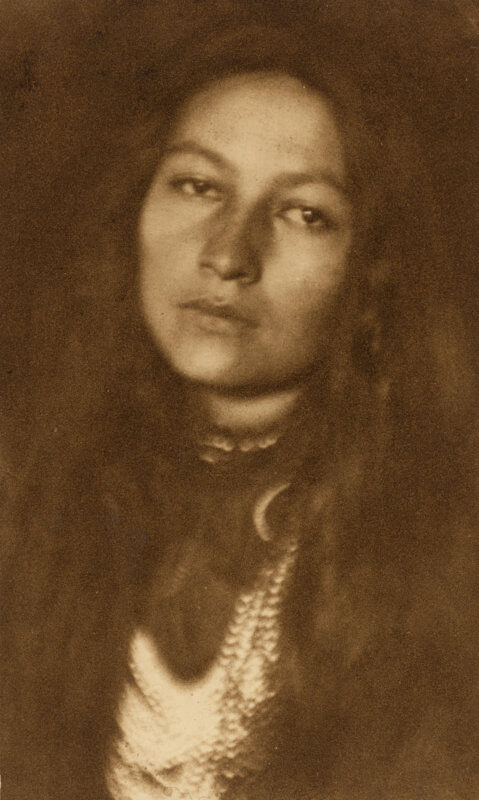In celebration of Women’s History Month, I thought I would share a relatively unknown story of someone I wished I had learned about when I was much younger. It spotlights a woman whose determination and unwavering spirit is something that offers inspiration in our very present day.

Zitkala-Sa was a Yankton (Dakota) Sioux. She was born in 1876–the year of the Battle of the Little Big Horn. When she was eight or nine years old, missionaries came to her reservation, changed her name to Gertrude Simmons, and took her to White’s Indiana Manual Labor Institute. Philadelphia Quaker Josiah White had willed funds to found the school to help poor children of different heritages assimilate into white society. While Zitkala-Sa lamented being forced to cut her hair and forced to convert, she also discovered that she loved reading and writing, and playing the violin.
Zitkala-Sa became a significant force in the quest for Native American rights, as well as a key literary figure. She defied the sexism and racism of that time period in extraordinary ways. Forced to exist in two different cultures, the dominant culture of America in the early 20th Century did not accept her. She admitted how this hardened her world view, writing, “Let us not look for good or justice: then we shall not be disappointed!”
She later wrote about her experiences in her story, “The School Days of an Indian Girl.” One passage is particularly poignant:
I remember being dragged out, though I resisted by kicking and scratching wildly. In spite of myself, I was carried downstairs and tied fast in a chair.
I cried aloud, shaking my head all the while until I felt the cold blades of the scissors against my neck, and heard them gnaw off one of my thick braids. Then I lost my spirit. Since the day I was taken from my mother I had suffered extreme indignities. People had stared at me. I had been tossed about in the air like a wooden puppet. And now my long hair was shingled like a coward’s! In my anguish I moaned for my mother, but no one came to comfort me. Not a soul reasoned quietly with me, as my own mother used to do; for now I was only one of many little animals driven by a herder.”
At the age of just nine, she fully understood the effort to strip her of everything she was.
But Zitkala-Sa refused to let go of her identity and returned to the reservation, only to find herself unwelcome. Like so many Native Americans who were educated at schools that forced them to give up their culture, those young people were caught between cultures. So, Zitkala-Sa chose education. She graduated from the school that caused her suffering and gave a speech at her graduation about women’s rights. She earned a scholarship to Earlham College. Then, she went on to play violin at the New England Conservatory of Music.
Determined to remain connected, she proceeded to teach music at the Carlisle Indian Industrial School—a school that was a destination for many Sioux. Eventually, she was fired for being critical of the policies of the school that forced young Native Americans to reject their heritage. She had written a national news story on the negative impact that schools like Carlisle had on young American Indian students.
With that, her writing career took off. She published articles about her life experience in Harper’s Monthly and Atlantic Monthly. She translated Sioux stories into Latin and then into English. She became politically active during WWI, advocating for Native American rights. Eventually, she went on to write an opera about the Sun Dance Ritual of the Sioux. A high point of her political activism was her effort to secure passage of the Indian Citizenship Act in 1924 that granted voting and civil rights to American Indians. She was the co-founder of the National Council of American Indians, and she served as that organization’s president until her death in 1938.
Zitkala-Sa’s story is a story of determination, perseverance, and of deep commitment to work on behalf of others. Zitkala-Sa’s story is amazing and uplifting, and, yet, painful. It speaks volumes that she took that pain and tried to fight for something good, educating all of us about the richness of Native American literature and culture. I encourage you to learn more about Zitkala-Sa and read her work.
